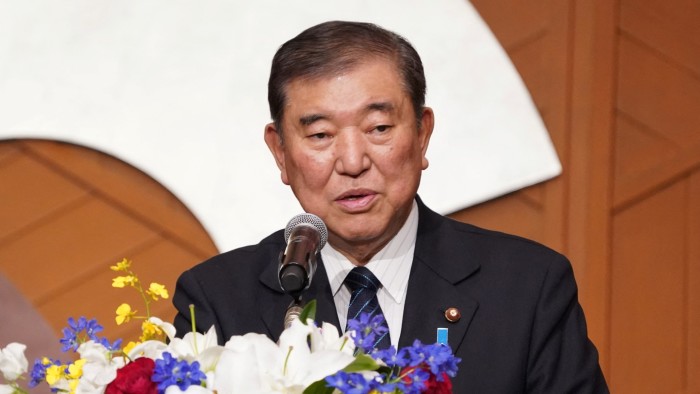Unlock the Editor’s Digest for free
Roula Khalaf, Editor of the FT, selects her favourite stories in this weekly newsletter.
Japan’s prime minister has said “every option” is under consideration as Tokyo reels from Donald Trump’s announcement of 25 per cent tariffs on car imports, in a significant escalation of Washington’s trade war.
Shigeru Ishiba’s comments in parliament came after Trump unveiled his latest trade salvo, which he said would go into effect on April 2, when Washington is expected to apply a range of reciprocal tariffs against US partners and allies.
“This is permanent, 100 per cent,” Trump said of the new car tariffs.
Shares of Japanese automakers tumbled between 2 per cent and 5 per cent on Thursday.
“We need to think about the best option for Japan’s national interest,” said Ishiba. “We are considering every option in order to reach the most appropriate response.”
Japan’s top spokesperson Yoshimasa Hayashi described the tariffs, which would hit an industry widely seen as the driving force of the Japanese economy, as “extremely regrettable”.
He added that the Trump administration’s emerging trade policy could have a major impact on bilateral ties, the global economy and the multilateral trading system.
Ishiba’s February meeting with Trump in Washington had initially been hailed as a success for reasserting the strength of the US-Japan alliance.
But traders in Tokyo said the unusual bluntness of Ishiba’s tone — along with the “every option” language — hinted at rising panic in Japanese corridors of power over the solidity of the relationship.
The tariff shockwaves reverberated elsewhere in Asia. Shares of South Korea’s largest carmakers fell, with Hyundai and its affiliate Kia both dropping about 4 per cent on Thursday.
Japan has gone to great lengths in recent weeks to lobby Washington for an exemption from tariffs, highlighting its status as the biggest supplier of foreign direct investment into the US.
The country’s economy and trade minister visited Washington this month, but the efforts have not secured the exemptions Japan had hoped for.
“Japan is the biggest investor into the United States, so we wonder if it makes sense for [the Trump administration] to apply uniform tariffs to all countries. That is a point we’ve been raising and will continue to do so,” said Ishiba.
Although Japanese carmakers have built significant production facilities in the US, their supply chains are heavily reliant on Canada and Mexico.
Japan is the largest exporter of finished vehicles to the US after Mexico, where Japanese companies are the dominant manufacturers. Japan sent $40bn worth of cars to the US in 2024, representing 28.3 per cent of its overall exports to the US.
Goldman Sachs analysts said the impact on Japanese exports could be “large” because cars and parts account for such a large proportion of exports to the US.
But they said the overall economic impact would be “somewhat limited” as Japan would not lose competitiveness against other car imports, estimating the hit to GDP at 0.1 percentage point.
Masanori Katayama, chair of the Japan Automobile Manufacturers Association, a lobby group, had previously warned that “significant production adjustment” would be required if US tariffs were introduced against vehicle imports from Japan, Mexico and Canada.
But Julie Boote, an analyst at Pelham Smithers, said tariff pressure could “ironically” force Japan’s fragmented carmaking industry to consolidate as smaller groups would need support.
South Korea’s industry minister Ahn Duk-geun said Korean carmakers would experience “considerable difficulties” due to the tariffs and promised to announce emergency measures next month, following a meeting on Thursday with industry executives.
Hyundai, whose $7.6bn hybrid and electric vehicle factory in Georgia began operations on Thursday, has also unveiled plans to expand US production capacity in anticipation of the Trump tariffs.
The carmaker on Tuesday announced $21bn of investment in the US, including a $5.8bn steel plant in Louisiana, as well as a target of producing 1.2mn vehicles annually in the country, up from 700,000 currently.
Read the full article here




